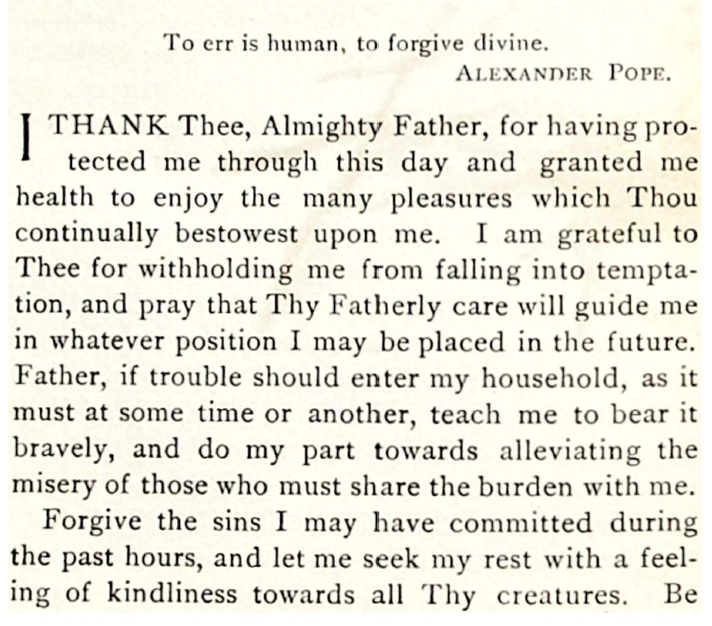| Contribute a translation | Source (English) |
|---|---|
To err is human, to forgive divine. (Alexander Pope.[1] From Alexander Pope’s An Essay on Criticism, Part Ⅱ (1711). ) | |
I thank Thee, Almighty Father, for having protected me through this day and granted me health to enjoy the many pleasures which Thou continually bestowest upon me. | |
I am grateful to Thee for withholding me from falling into temptation, and pray that Thy Fatherly care will guide me in whatever position I may be placed in the future. | |
Father, if trouble should enter my household, as it must at some time or another, teach me to bear it bravely, and do my part towards alleviating the misery of those who must share the burden with me. | |
Forgive the sins I may have committed during the past hours, and let me seek my rest with a feeling of kindliness towards all Thy creatures. | |
Be Thou near me and my dear ones through this night, and grant that we may all meet on the morrow refreshed by sleep and prepared to follow our several pursuits. Amen. |
This untitled “Evening Meditation” was written by Annie Josephine Levi and published in her anthology of teḥinot in English, Meditations of the Heart (1900), pp. 108-109.
Source(s)

Notes
| 1 | From Alexander Pope’s An Essay on Criticism, Part Ⅱ (1711). |
|---|

“An Evening Meditation, by Annie Josephine Levi (1900)” is shared through the Open Siddur Project with a Creative Commons Attribution-ShareAlike 4.0 International copyleft license.



![[evening meditation for the young] (Annie Josephine Levi 1900)](https://opensiddur.org/wp-content/uploads/2023/04/evening-meditation-for-the-young-Annie-Josephine-Levi-1900-250x250.png)


![on the loss of a beloved one [morning meditation] (Annie Josephine Levi 1900) - cropped](https://opensiddur.org/wp-content/uploads/2023/04/on-the-loss-of-a-beloved-one-morning-meditation-Annie-Josephine-Levi-1900-cropped-250x250.png)



Leave a Reply